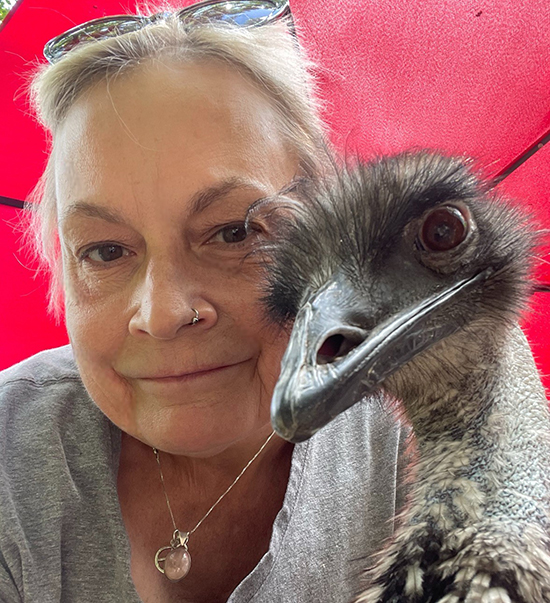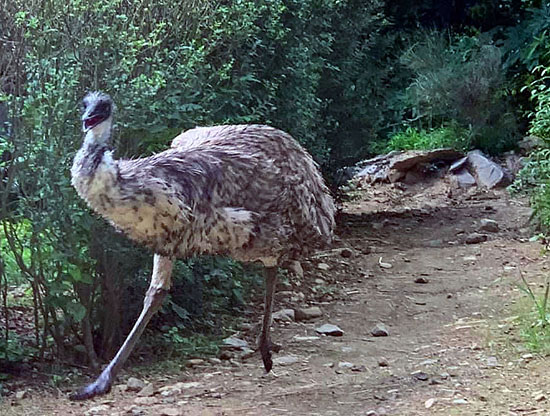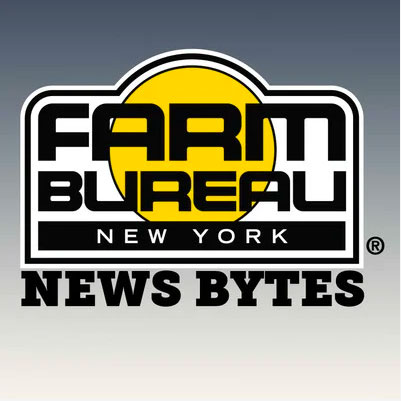Ulster County Emu Farmer Believes in Growth for the Large Birds
by Steve Ammerman
sammerman@nyfb.org
A New York emu farmer is hoping the idea of raising the flightless birds takes flight itself. Kymara Lonergan, an experienced emu farmer and a member of Ulster County Farm Bureau, has a passion for the birds as well as educating others about their benefits.
Lonergan has four birds on her farm, Thunder Horse Hollow, in the foothills of the Catskills. She wanted to raise them ever since seeing them on television as a child. She says despite the myth, the birds don’t require a lot of acreage.
“They don’t need a ton of land. They aren’t like cattle,” she emphasizes.

She says emu thrive in a micro-farming setting, making them an ideal choice for those interested in raising them for meat and oil production. She recommends at least a six-foot fence to keep the birds confined because they can jump at least five feet high and can reach running speeds of 30 miles per hour. She adds, they are also well suited for farms with wooded land used for grazing.
“If your farm is in silvopasture, emu are the most perfect creatures for that, because they are grazers, and they would love to go amongst the trees and eat your bugs,” she said. With that, the emu can play a crucial role in pest control, devouring invasive species like the spotted lantern fly. And despite occasional crankiness in male emus during the breeding season, Lonergan assures that they are generally friendly and easy to interact with on a daily basis.
In general, the birds are raised for two main things, their meat and the oil produced from their fat. The meat is actually gaining in popularity, in part as a response to the rise of alpha-gal syndrome, an allergy to red meat caused by Lone Star tick bites.
“Emu is a red meat, but it is not a dark. It’s not the same as turkey. It’s a very different type of meat,” said Lonergan.
As the conversation shifts to emu oil, Lonergan spoke of its potential benefits. “Emu oil is high in all of the omega fatty acids, and it is very similar to the makeup of the human skin,” she states, highlighting its versatile applications. Lonergan envisions a future where New York’s emu farmers gain recognition as producers of both high-quality emu meat and oil.
However, the growth of the emu farming industry faces a bottleneck due to a lack of processing facilities in New York State.
“If we could get together and form a co-op, as such as they did in Vermont did some years ago, we could work together and get our birds up to New Hampshire, where they do process emu,” she added.
Lonergan’s farm is a no-kill farm. She uses the emu manure as fertilizer for many of the edible flowers and herbs she grows and sells, including saffron and lavender. The herbs are combined with the emu oil purchased from certified and respected processors for the skin care products that she produces and sells, in conjunction with a chemist in upstate New York.
“The animals do earn their keep by being models for the advertising of what we grow to sell and the products we create,” said Lonergan.
In addition to serving on the Ulster County Farm Bureau board, Lonergan is vice president of the American Emu Association and chair of its education committee. She finds great value in spreading the word about emu and the benefits of maintaining family farms, especially in places like the Hudson Valley where there is immense development pressure and pushback from neighbors.
“Keeping the public educated is so important to keep farming alive, and that’s why it’s so important to me,” she said.
Lonergan was concerned when a New York State lawmaker proposed a bill to ban people from owning emu, but worked with New York Farm Bureau to push back on the legislation. She was also successful in getting emu recognized in the New York State Grown and Certified Program. Her passion keeps her hopeful about the future. With approximately a hundred emu farmers currently in New York State, Lonergan sees immense potential for growth.
“We need more emu farmers now in New York State so that we can supply the demand,” she urges.
To learn more, Lonergan will be featured on an upcoming edition of New York Farm Bureau’s News Bytes podcast.



